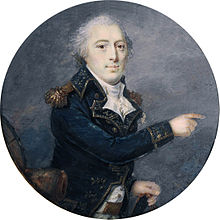Pierre Thouvenot
| Pierre Thouvenot | |
|---|---|

General Baron Thouvenot by Antoine-Claude Fleury
|
|
| Born | 9 March 1757 Toul, France |
| Died | 21 July 1817 (aged 60) Orly, France |
| Years of service | 1779–1793 |
| Rank | General |
| Awards |
Baron de l'Empire Officier de la Légion d'honneur Chevalier de Saint-Louis |
Pierre Thouvenot (9 March 1757 – 21 July 1817) was a French Army officer who served with distinction in the American Revolutionary War. He fled from France during the revolution but returned under an amnesty and went on to serve in Napoleonic Wars. Thouvenot is most famous for his defence of Bayonne in 1814 and the sortie he made when the war was all but over, which drew criticism from both sides, particularly from the Duke of Wellington, who branded him a "blackguard".
Thouvenot was born on 9 March 1757 in Toul, Meurthe-et-Moselle, France. He did not join the military until 1779, having spent the previous five years as a geographical engineer. He enrolled in L'école d'artillerie de La Fère, leaving as a cadet in the French artillery during December 1779. He served for a time on the Île de Ré where he became a Second-lieutenant in 1780 before being sent to Guadeloupe. He distinguished himself in Bouillé's attack on St Lucia in May 1781, and took part in the subsequent invasion of Tobago. Thouvenot received a promotion to Lieutenant in 1783 and continued to serve in the Caribbean following the Treaty of Paris. He was promoted to Capitain in 1788 and was made a Chevalier de Saint-Louis (Knight of Saint Louis) in 1791 and was appointed to the foundry at Indret, near Nantes, initially as an inspector but later as the director. Towards the end of 1792, Thouvenot was promoted to lieutenant-colonel and was transferred, as director, to the foundry at Malines.
Leaving naval armament behind in December 1792; Thouvenot returned to serving with the army in the field as the commander of the Belgium artillery and in February the following year, he became attached to General Charles-François du Perrier Dumouriez, as his chief of staff. When, some two months later, a warrant for his arrest was issued by the new government in France, Thouvenot was prompted to flee Belgium. He was captured by Austrian soldiers and imprisoned at Treurenberg. After his release in 1794, Thouvenot sought refuge in the neutral country of Brunswick where he remained until an amnesty was granted by Napoleon in 1800.
...
Wikipedia
